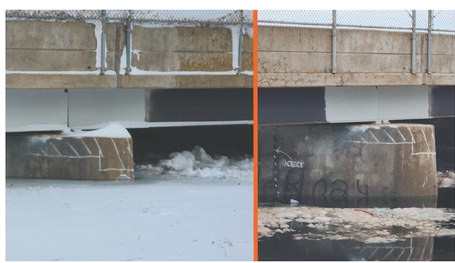The flooding in Au Train has significantly slowed down, with the river dropping over two feet at its mouth into Lake Superior.
“There are three areas where the water is flowing out very nicely. One wasn’t flowing as fast, but it was another possibility for an outlet,” Au Train Township Supervisor Michelle Doucette said. “It’s getting less day by day.”
Official measurements say the water is 24.5 inches lower at the river mouth and over 36 inches lower at the Doucette Bridge. Popular amongst recreational kayakers, the water was almost twice its normal depth at the peak of the flooding.
Wednesday’s snow storms did not rebuild any of the natural dams backing up the river, so there is no further build up of floodwaters, according to Doucette.
This weekend, the Red Cross dropped off bottled water for drinking and flood clean-up kits for those impacted by the flood waters. According to Doucette, some inland homeowners are still operating sump pumps to keep their crawlspaces and basements dry.
“There’s not a whole lot that the Red Cross can do, since people are safe in their homes. There’s extra kits available though for those that need them, so get a hold of us and we can get you one,” Au Train Township Clerk Mary Walther Johnson said.
Sand dunes directly to the west of the river mouth are not helping the situation, as erosion has a chance to build back up sand berms limiting water flow. The township is applying for additional permits to allow the township to have a standing emergency permit in place of future flooding. Other permits being applied for will allow the township to do additional maintenance dredging to help the river flow if the township can afford to take the expensive corrective action.
Numerous government agencies and officials have personally reviewed the area, from EGLE, MDOT, Michigan State Police, local Representative Jenn Hill and other municipal and county personnel. However, Doucette is hoping to find a way to not reinvent the wheel and find another municipality that has dealt with similar flooding patterns to find a long term solution.
“As a small community, we don’t have the money to match for grants. Those are very expensive and there’s no way our small township can afford it,” Doucette said. “What have other municipalities done on the Great Lakes? That’s my question to Jenn Hill, to MDOT, to the (Michigan Township Association). There has to be other municipalities that have experienced the same thing. What have they done?”
Doucette said that those looking for additional information should use the township’s Facebook page as a source of information moving forward. A public meeting between EGLE, MDOT, Army Corps of Engineers and Michigan State Police Emergency Management is being scheduled so the public can address issues in the future, but no date has been set yet.
